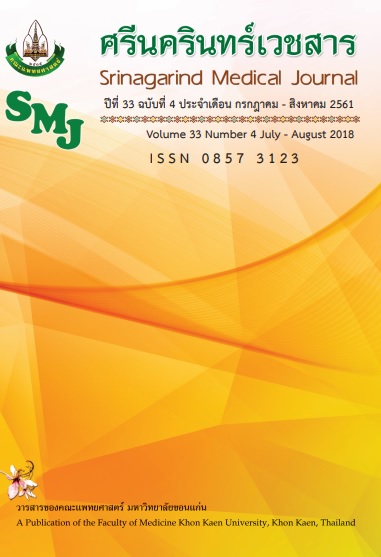The Development of Quality of Life Database Software for Use at Renal Disease Clinics
Keywords:
Quality of life (QoL); The 9-item Thai Health status Assessment Instrument (9-THAI); Quality of life database softwareAbstract
Background and Objective: The 9-item Thai Health status Assessment Instrument (9-THAI) is a QoL assessment tool developed by Thai researchers that is both accurate and precise for the general population as well as renal patients. This tool is a short-form containing only 9 items but it may have limitations on calculating and interpreting outcome scores. The objectives of this study was to develop a QoL database software for use with patients at renal disease clinics
Method: The development process of this research and development study included ascertaining the system requirements; designing the system; coding, tailoring and software development; testing the software by researchers and implementing at one hemodialysis unit; and promoting the program at conferences hosted by The Thai Nephrology Nurses Society. The QoL program developed from MySQL data management system and Delphi programming language. The questionnaire was launched to assess the quality of the software.
Result: The quality of the software assessed by nursing sample were good level, an average mean score was 3.71 from 5.00 (standard deviation was 0.56). The intention to use the software to monitor the outcomes of treatment with patients at renal disease clinics were good level, an average mean score was 4.11 from 5.00 (standard deviation was 0.82).
Conclusion: The developed software is considered of an acceptable quality. It can be used in conjunction with the 9-THAI as a tool to assess patients quality of life at renal disease clinics.
References
2. Moreiras-Plaza M, Blanco-García R, Cossio-Aranibar CR, Rodriguez-Goyanes G. Assessment of health-related quality of life: the cinderella of peritoneal dialysis? Int J Nephrol 2011; 2011: 528685.
3. DeOreo PB. Hemodialysis patient-assessed functional health status predicts continued survival, hospitalization, and dialysis-attendance compliance. Am J Kidney Dis 1997; 30: 204-12.
4. Grincenkov FR, Fernandes N, Pereira Bdos S, Bastos K, Lopes AA, Finkelstein FO, et al. Impact of baseline health-related quality of life scores on survival of incident patients on peritoneal dialysis: a cohort study. Nephron 2015; 129: 97-103.
5. Lowrie EG, Curtin RB, LePain N, Schatell D. Medical outcomes study short form-36: a consistent and powerful predictor of morbidity and mortality in dialysis patients. Am J Kidney Dis 2003; 41: 1286-92.
6. Mapes DL, Lopes AA, Satayathum S, Mccullough KP, Goodkin DA, Locatelli F, et al. Health-related quality of life as a predictor of mortality and hospitalization: the Dialysis Outcomes and Practice Patterns Study (DOPPS). Kidney Int 2003; 64: 339-49.
7. Tsai Y-C, Hung C-C, Hwang S-J, Wang S-L, Hsiao S-M, Lin M-Y, et al. Quality of life predicts risks of end-stage renal disease and mortality in patients with chronic kidney disease. Nephrol Dial Transplant 2009; 25: 1621-6.
8. อารีวรรณ เชี่ยวชาญวัฒนา. คุณภาพชีวิต จิตวิญญาณของผู้ป่วยโรคไต: ความท้าทายในการดูแลรักษาผู้ป่วยอย่างมีคุณภาพ. ใน: เถลิงศักดิ์ กาญจนบุษย์, บรรณาธิการ. ตำราแนวปฏิบัติการล้างไตทางช่องท้อง. กรุงเทพฯ: คณะแพทยศาสตร์ จุฬาลงกรณ์มหาวิทยาลัย; 2556: 757-99
9. Spilker B. Quality of life and pharmacoeconomics in clinical trials. 2nd ed. Philadelphia (PA): Lippincott-Raven Publishers; 1996.
10. Schmidt S, Bullinger M. Current issues in cross-cultural quality of life instrument development. Arch Phys Med Rehabil 2003; 84: S29-S34.
11. วิโรจน์ ตั้งเจริญเสถียร, อารีวรรณ เชี่ยวชาญวัฒนา, จุฬาภรณ์ลิม วัฒนานนท์, จิตปราณี วาศวิท, สงวน ลือเกียรติบัณฑิต, จีราวรรณ บุญเพิ่ม. รายงานสถานะสุขภาพคนไทย: การวิเคราะห์ข้อมูลจากการสำรวจอนามัยและสวัสดิการ พ.ศ.2546. วารสารวิชาการสาธารณสุข 2549; 15: 515-27.
12. Cheawchanwattana A, Limwattananon C, Gross C, Limwattananon S, Tangcharoensathien V, Pongskul C, et al. The validity of a new practical quality of life measure in patients on renal replacement therapy. J Med Assoc Thai 2006; 89: S207-17.
13. อารีวรรณ เชี่ยวชาญวัฒนา, ดรุณี จันทร์เลิศฤทธิ์. ความตรงตามเกณฑ์ชนิดทำนายของเครื่องมือวัดคุณภาพชีวิตที่เกี่ยวเนื่องกับสุขภาพ 9-THAI โดยการทำนายอัตราการรอดชีพของผู้ป่วยล้างไต. วารสารสมาคมพยาบาลฯ ภาคตะวันออกเฉียงเหนือ 2555; 30: 23-31.




